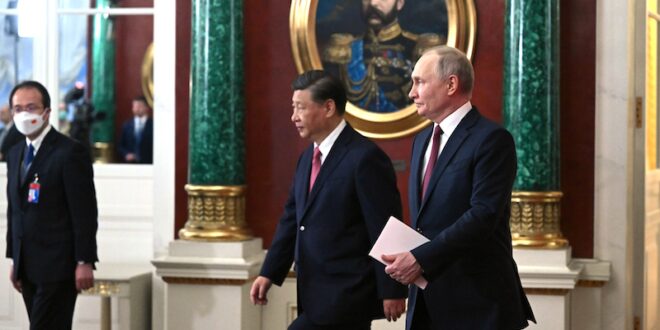Russia and China post-Ukraine invasion by Russia by all visible indicators stand intertwined geopolitically and strategically compelled by their respective diplomatic isolations of Russia by NATO and China by United States–led alliances and Strategic Partnerships in Indo Pacific, leading to the crucial question as to whether the Ukraine-cemented Russia-China Strategic Partnership will be ‘Transactional” or “Enduring”?
Russia undoubtedly stands diminished geopolitically and militarily diminished after nearly a year and a half of launching its military misadventure in Ukraine. Russia has failed to achieve its strategic objective of stopping a NATO-Creep into Ukraine. Russia has suffered staggering losses in terms of Russian Army lives lost and depletion of critical Russian Army offensive military hardware.
Russia has consequently turned to Chia in a significant way to assist Russia’s depleting war-waging offensive capabilities. China naturally has denied any such involvement with Russia but there are enough intelligence reports and assessments to reinforce US & Western reports.
China has a vested strategic interest in prolonging Russia’s debilitating involvement in the Ukraine military imbroglio. This has been touched upon in my earlier writings on this aspect.
Russia’s continued military embedment in Ukraine diminishes Russia’s military might and its geopolitical weightage in global geopolitical calculus. Resultantly, China gains on two counts. Firstly, Russia’s strategic dependence on China across all domains of power calculus facilitates China emerging as the ‘senior partner’ in the Russia-China Strategic Partnership.
Secondly and more significantly, in global geopolitical perceptions, China gains at the expense of Russia. In terms of global power-play and Russia-China Axis weightage, Russia is growingly perceived as “Russia as a Declining Power’ and ‘China as a Rising Potential Superpower’.
Russia as an erstwhile Superpower and historically as the ‘Dominant Partner’ in the Russia-China Strategic Partnership should expectantly be assessed to be silently “resentful” of this role-reversal. Russia’s policy planning establishment would also be aware of China’s increasing strategic vulnerabilities both external and domestic spawned by decline in economic growth rates.
When historical baggage that China carries against Russia in terms f demonstrated performance against Russian national security interests then China logically should emerge as even more dismal and “suspect “in Russia’s strategic perceptions.
Briefly, ‘China’s Adverse Baggage’ against Russia historically can be briefly recounted as (1) China’s boundary disputes with Former USSR and Armed Hostilities (2) China betraying USSR by entering into a quasi-strategic alliance with United States going to extent of permitting US intelligence snooping stations on China’s borders with Russia (3) China’s ongoing illegal migration into Russia’s Far East Provinces running into millions and instigating Russian provincial governments to secede from Russia and join China (4) China strategic encroachment on Russia’s turf in Arctic.
Surely, in Russia’s strategic planning perspectives, China’s past and developing Chinese strategic vulnerabilities can force China to “Switch “sides to the United States, as done decades back. China’s importance in global power-calculus arises from what one can term as “Russian Forbearance”.
Russia in the first decade of this Century made a remarkable resurgence t retain its power-status and can do so again once it disentangles from Ukraine. Its economic recovery can be made possible by Europe accessing Russian energy supplies which are now being drained by China completely,
When the Russia-China Strategic Partnership is analysed in totality of above enumerated factors, one is constrained to conclude that the much-vaunted ongoing so-called unbreakable Russia-China Strategic Partnership is ‘fragile” resting on weak foundations of lack of “full strategic trust”.
Contextually, it follows that the Russia-China Strategic Partnership is “Transactional” in nature and intents and cannot be assessed to be of Long Endurance”.“
Concluding, and I assert, with full confidence based on over two decades of intense geopolitical analysis of US-Russia relations, US-China relations and Russia-China relations, that it is within the diplomatic power and capabilities of the United States to “UNRAVEL” the ongoing Russia-China Strategic Partnership, if ONLY the United States has the will and inclination to ‘Reset US-Russia Relations”.
Both United States and Russia have a shared history of reasonable global security management during 45 years of Cold War I. China contrastingly has ever since its inception been always adversarial to the United States.
 Eurasia Press & News
Eurasia Press & News




